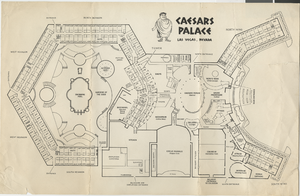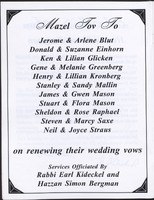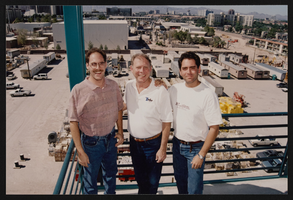Search the Special Collections and Archives Portal
Search Results

Transcript of interview with Sharon Walker by Barbara Tabach, October 8, 2014
Date
Archival Collection
Description
Sharon Walker is a real estate investor, retired stockbroker and former loan officer. She was born on December 8, 1949 in Toledo, Ohio, and moved to Las Vegas with her family in 1963, where they started Walker Furniture, a store which they later sold to the Alterwitz family. Sharon's father, Julius Walker, was also in the casino business, becoming an owner of the El Cortez Hotel and Casino with Jackie Gaughan. Her mother, Anne Walker was a founding member of the first local Hadassah, The Women?s Zionist Organization. Sharon continues the family tradition of being active in Hadassah as well as being a Board Member of Jewish Family Service Agency. In November 2014 she was an honoree of Hadassah Leadership. In this interview, Sharon describes her adolescence in Las Vegas and the differences in culture as compared to her childhood in Toledo, Ohio. She also recalls the Walker Furniture business, her father?s careers, and her uncles Ed ?E? Walker and Lou ?Paddock? Walker.
Text

Transcript of interview with George Levine by Barbara Tabach, April 16, 2015
Date
Archival Collection
Description
In this interview, George reflects upon his life in Las Vegas, particularly the period as ma?tre d? of the Sand?s Copa Room. Joined by his daughter - and former United States Democratic Congresswomen-Shelley Berkley, George shares stories of working in the gaming industry during this unique era, including those of Frank Sinatra and Wayne Newton. He also talks about his life as a professional gambler.
Born on February 28, 1925 in Sommerville, New Jersey, George Levine?s family moved to his childhood home, Manhattan?s Lower East Side, when he was six months old. George served on a United States Navy aircraft carrier for thirty months during World War II. After returning home, he met his first wife Estelle, with whom he had two daughters, and soon moved to Kiamesha Lake, New York to work at the Concord Resort Hotel. In 1963, George and his family moved to Las Vegas and took his first job at Mr. Sy?s Casino. Six months later he began waiting tables at the Sands Hotel and Casino. He worked his way up the ranks and was ma?tre d' from 1979 until the hotel closed in 1996.
Text

Transcript of interview with Marla Letizia by Barbara Tabach, August 26, 2015
Date
Archival Collection
Description
In this interview, Letizia discusses her career, and breaking gender barriers in both broadcasting as well as in advertising. She also talks about how her family ended up settling in Las Vegas, and the evolution of her relationship with Judaism from childhood to adulthood, eventually leading to her leadership roles with Congregation Ner Tamid as well as Jewish Federation, where she is on the Board of Directors.
Marla R. Letizia is the founder of Big Traffic Mobile Billboards in Las Vegas, Nevada. The company operates mobile billboard advertising trucks and employs brand ambassadors to carry WOBI? walking billboards for retail, gaming, and entertainment clients such as Caesars entertainment, Tropicana, and Cirque Du Soleil. Letizia founded Big Traffic in 2001 after leaving a successful broadcast journalism career to raise her two children. She met her husband, Tom Letizia, while working at KLAS-TV Channel 8 as an assistant production manager. She later became the first female director of live television news broadcasts in Las Vegas at Channel 8. She also developed a TV show called "Las Vegas Turnaround" and a syndicated production called "The Parenting Network." Letizia grew up in Las Vegas, and is a former president of Congregation Ner Tamid and a founding member of the board of trustees of the Meadows School in Las Vegas. In this interview, Letizia discusses her career, and breaking gender barriers in both broadcasting as well as in advertising. She also talks about how her family ended up settling in Las Vegas, and the evolution of her relationship with Judaism from childhood to adulthood, eventually leading to her leadership roles with Congregation Ner Tamid as well as Jewish Federation, where she is on the Board of Directors.
Text

Map of Caesars Palace buildings, circa 1969
Date
Archival Collection
Description
Labeled map of the original buildings of Caesars Palace resort, hotel, and casino.
Image

Transcript of interview with Arne Rosencrantz by Claytee White, February 9, 2010
Date
Archival Collection
Description
In this interview, focused on the John S. Park neighborhood of Las Vegas, Arne Rosencrantz discusses his childhood growing up in Las Vegas. He talks about local businesses, including his father's furniture store, as well as schools and churches in the neighborhood.
Arne Rosencrantz remembers living on Beverly Way from 1954 to 1970. Like so many others from that era, he attended Fifth Street School, John S. Park Elementary School, John C. Fremont Middle School and graduated from Las Vegas High School. As a Jew, he was in a small minority, but fondly recalls growing up in the dense Mormon population of John S. Park Neighborhood. As a youngster, life in Las Vegas was filled with fun. The desert provided opportunity to hunt lizards and rabbits. Kids walked to school without concern. They played ball and found the Strip casinos welcoming to locals. He tells how the social issue of segregation of the 1960s did not affect him personally, but how local movie theatre owner Lloyd Katz fought to make his Huntridge and Fremont theatres integrated. He also reminisces about his father opening Hollywood Furniture and later Garrett's Furniture, which Arne operated until retiring in 2001. During the interview, he lists other furniture companies and the strong assortment of other retailers and restaurants that served the neighborhood.
Text

Transcript of interview with Maurice "Maury" Halfon Behar by Barbara Tabach, March 14, 2016
Date
Archival Collection
Description
In this interview, Behar reflects upon his childhood in France, and later adjusting to life in New York. He talks of his admiration for those that have cared for him in his youth, including Marie Cazous and his parents, Marco and Flora Behar. He details his career path, and how he ended up in Las Vegas. In addition, Behar describes a recent family trip to France, visiting his place of birth for the first time since leaving as a child.
Text

Program for The Wedding event at Temple Beth Sholom, June 11, 1995
Date
Archival Collection
Description
Booklet for the Wedding celebrations and vow renewals of couples at Temple Beth Sholom.
Text

Photographs of MGM construction and topping off party, Las Vegas (Nev.), circa 1992
Date
Archival Collection
Description
Thirty five photographs of the MGM topping off party, celebrating the "second" construction of the hotel and casino. Festivites took place on a nearby rooftop and were hosted by Larry Woolf, President of MGM.
Image

Transcript of interview with Marc Ratner by Barbara Tabach, August 23, 2016
Date
Archival Collection
Description
Marc Ratner moved to Las Vegas when he was in the seventh grade in 1957. His father became owner of a retail beauty supply business. It also was about the time Marc became a bar mitzvah. The Ratner family belonged to Temple Beth Sholom, as did everyone at the time, and a favorite memory he recalls is of sneaking a glimpse of crooner Eddie Fisher and actress Elizabeth Taylor getting married there. While growing up, Marc showed no particular interest in being a star athlete. He played little baseball and participated in track as a long jumper. Nevertheless, on the day of this oral history interview, Marc is sitting in his office surrounded by sports memorabilia. It is all a testimony, a museum highlighting his decades of officiating and regulating sports events. His stories include newsworthy boxing episodes that ranged from the infamous ?Fan Man? parachutist incident in 1963 during the Evander Holyfield vs Riddick Bowe fight at Caesars and the 1997 ?Bite Fight? when Mike Tyson took a bite out of Evander Holyfield?s ear. v In 2016, Marc was inducted into the International Boxing Hall of Fame, an extraordinary honor for a nonparticipant. He has long been a fan of the sport and talks about the first fight he ever attended, becoming a ring inspector in 1985 and then starting a new phase of his career in 2006, as Vice President of Regulatory Affairs for the Ultimate Fighting Championship [UFC]. In addition, Marc has dedicated much his life blowing the whistle at high school and college sports: he?s officiated on the football field for several conferences, bowl games and mentors would-be officials. He served as Nevada State Athletic Commission executive director for two decades. Among his community involvement is serving on the board of Jewish Family Services Agency. In 1997 he was honored by the National Council of Christians and Jews. Marc Ratner moved to Las Vegas when he was in the seventh grade in 1957. His father became owner of a retail beauty supply business. It also was about the time Marc became a bar mitzvah. The Ratner family belonged to Temple Beth Sholom, as did everyone at the time, and a favorite memory he recalls is of sneaking a glimpse of crooner Eddie Fisher and actress Elizabeth Taylor getting married there. While growing up, Marc showed no particular interest in being a star athlete. He played little baseball and participated in track as a long jumper. Nevertheless, on the day of this oral history interview, Marc is sitting in his office surrounded by sports memorabilia. It is all a testimony, a museum highlighting his decades of officiating and regulating sports events. His stories include newsworthy boxing episodes that ranged from the infamous ?Fan Man? parachutist incident in 1963 during the Evander Holyfield vs Riddick Bowe fight at Caesars and the 1997 ?Bite Fight? when Mike Tyson took a bite out of Evander Holyfield?s ear. v In 2016, Marc was inducted into the International Boxing Hall of Fame, an extraordinary honor for a nonparticipant. He has long been a fan of the sport and talks about the first fight he ever attended, becoming a ring inspector in 1985 and then starting a new phase of his career in 2006, as Vice President of Regulatory Affairs for the Ultimate Fighting Championship [UFC]. In addition, Marc has dedicated much his life blowing the whistle at high school and college sports: he?s officiated on the football field for several conferences, bowl games and mentors would-be officials. He served as Nevada State Athletic Commission executive director for two decades. Among his community involvement is serving on the board of Jewish Family Services Agency. In 1997 he was honored by the National Council of Christians and Jews. Marc Ratner moved to Las Vegas when he was in the seventh grade in 1957. His father became owner of a retail beauty supply business. It also was about the time Marc became a bar mitzvah. The Ratner family belonged to Temple Beth Sholom, as did everyone at the time, and a favorite memory he recalls is of sneaking a glimpse of crooner Eddie Fisher and actress Elizabeth Taylor getting married there. While growing up, Marc showed no particular interest in being a star athlete. He played little baseball and participated in track as a long jumper. Nevertheless, on the day of this oral history interview, Marc is sitting in his office surrounded by sports memorabilia. It is all a testimony, a museum highlighting his decades of officiating and regulating sports events. His stories include newsworthy boxing episodes that ranged from the infamous ?Fan Man? parachutist incident in 1963 during the Evander Holyfield vs Riddick Bowe fight at Caesars and the 1997 ?Bite Fight? when Mike Tyson took a bite out of Evander Holyfield?s ear. v In 2016, Marc was inducted into the International Boxing Hall of Fame, an extraordinary honor for a nonparticipant. He has long been a fan of the sport and talks about the first fight he ever attended, becoming a ring inspector in 1985 and then starting a new phase of his career in 2006, as Vice President of Regulatory Affairs for the Ultimate Fighting Championship [UFC]. In addition, Marc has dedicated much his life blowing the whistle at high school and college sports: he?s officiated on the football field for several conferences, bowl games and mentors would-be officials. He served as Nevada State Athletic Commission executive director for two decades. Among his community involvement is serving on the board of Jewish Family Services Agency. In 1997 he was honored by the National Council of Christians and Jews.
Text

Transcript of interview with Jean Tobman, Marilyn Moran and Janie Moore by Claytee D. White, November 5, 2013
Date
Archival Collection
Description
Interview with Jean Tobman and two of her daughters, Marilyn (Tobman) Moran and Janie (Tobman) Moore by Claytee White, November 5, 2013. In this interview, Jean Tobman recalls coming to Las Vegas with her husband and two young children in the 1950s, and the life they established in the Pinto area of the Westside. Her husband, Herb, owned City Furniture and a cab company near downtown. Marilyn and Janie discuss their youth and the enjoyable time they had growing up in Las Vegas. Marilyn talks about how the city has grown and her time on the planning commission. Janie also discusses the growth of Las Vegas and her nostalgia for old Las Vegas.
In 1953, Jean and Herb Tobman moved from New Jersey to Las Vegas. The Tombans settled in the Pinto Palamino. Upon moving, Jean initially assisted her mother at her rooming house, and Herb worked with Jean's father at City Furniture. Herb bought his first cab soon thereafter, and grew one vehicle into Western Cab Company, which is still family-run. After a large fire closed City Furniture, Herb worked as the general manager at Moulin Rouge, jumpstarting his career in the gaming industry. Marilyn, Janie and Helen are the children of Jean and Herb and all still live in Las Vegas. The girls grew up keeping horses, as did many other neighbors in the Pinto area. Marilyn married John Moran, the sheriff's son, who served as a police officer himself. She sat on the planning commission for a decade, during the city's growth spurt. Janie spent a semester at Arizona State University before returning to Las Vegas to work at Stardust Hotel, a property co-owned by her father, who also served as the its president.
Text
